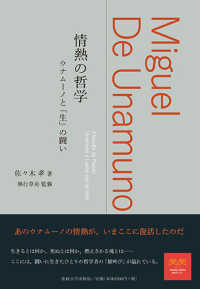- ホーム
- > 洋書
- > 英文書
- > Biography / Autobiography
Full Description
In 2012, Richard E. Wainerdi retired as president and chief executive officer of the Texas Medical Center after almost three decades at the helm. During his tenure, Wainerdi oversaw the expansion of the center into the world's largest medical complex, hosting more than fifty separate institutions. "I wasn't playing any of the instruments, but it's been a privilege being the conductor," he once said to a newspaper reporter.
William Henry Kellar traces Wainerdi's remarkable life story from a bookish childhood in the Bronx to a bold move west to study petroleum engineering at the University of Oklahoma. Wainerdi went on to earn a master's degree and a PhD from Penn State University where he immersed himself in nuclear engineering. By the late 1950s, Texas A&M University recruited Wainerdi to found the Nuclear Science Center, where he also served as professor and later associate vice president for academic affairs.
In the 1980s, Wainerdi took charge of the Texas Medical Center, embarking on a "second career" that ultimately expanded the center from thirty-one institutions to fifty-three and increased its size threefold. Wainerdi pushed for and ensured a culture of collaboration and cooperation. In doing this, he developed a new nonprofit administrative model that emphasized building consensus, providing vital support services, and connecting member institutions with resources that enabled them to focus on their unique areas of expertise. At a time when Houston was widely known as the "energy capital of the world," the city also became home to the largest medical complex in the world. Wainerdi's success was to enable each member of the Texas Medical Center to be an integral part of something bigger and something very special in the development of modern medicine.





